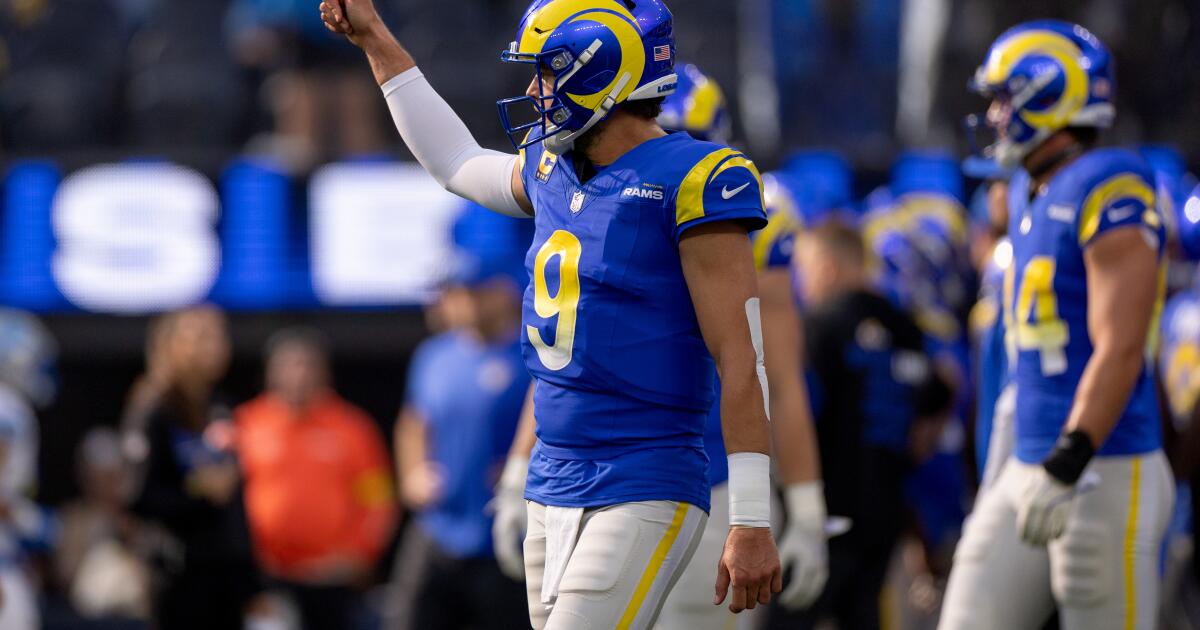Rams’ Matthew Stafford not concerned about Pro Bowl selections
Matthew Stafford was voted to the Pro Bowl this season, but the Rams veteran quarterback stopped concerning himself about the recognition more than a decade ago.
In 2011, the then third-year pro passed for more than 5,000 yards and 41 touchdowns for the Detroit Lions.
Stafford thought he had a chance to make the NFC roster, but Aaron Rodgers, Drew Brees and Cam Newton got more votes.
“Wasn’t even close,” Stafford said, chuckling, on Wednesday. “So at that point, I kind of reserved myself to just go play, have fun and whatever happens, happens.
“But it is cool to be a part of it.”
Stafford, who also was voted to the Pro Bowl in 2014 and 2023, is a leading contender for perhaps the NFL’s most prestigious award — most valuable player.
Stafford, 37, has passed for a league-leading 4,179 yards and 40 touchdowns, with five interceptions, while leading a Rams team that is 11-4 and currently seeded No. 6 in the NFC going into Monday night’s game against the Atlanta Falcons (6-9) at Mercedes-Benz Stadium.
The Rams are averaging 30.5 points and 396.7 yards per game, both tops in the NFL. They rank second in passing (270.5 yards per game) and fifth in rushing (126.3 yards per game).
In last Thursday’s 38-37 overtime loss to the Seattle Seahawks, Stafford passed for 457 yards and three touchdowns. Yet he was outdueled by fellow Pro Bowl pick Sam Darnold, who led a touchdown drive in overtime and capped it with a game-winning two-point conversion pass.
Stafford is preparing to face a Falcons defense that ranks 14th overall, but eighth against the pass, giving up 195.1 yards per game.
Asked if he was surprised that Stafford has only been voted to the Pro Bowl three times, Rams coach Sean McVay said yes, adding that there were “a lot of layers to the Pro Bowl stuff.”
“You talk to the real football people. … I think he’s seen as a guy that’s one of the best ever to do it,” McVay said. “I think that’s been very well acknowledged this year but I think it’s probably overdue.”
Stafford has “elevated” everybody around him since the Rams traded for him in 2021, McVay said.
“The best part about Matthew is, he’s got this great humility,” McVay said, adding, “What he cares about are the respect of his teammates, his coaches and the people he’s playing against. And I think when you talk to those who know, hes got great respect and admiration for the way that he competes, the way he goes about it and what type of player he is.”
Etc.
Receiver Davante Adams (hamstring) and offensive lineman Kevin Dotson (ankle) are making “good progress,” but McVay did not provide a definitive update on their status for the game against the Falcons. … The Rams opened the 21-day window for cornerback Roger McCreary (hip) to return from injured reserve. McVay said “most likely” that the Rams will open the 21-day window for safety Quentin Lake (elbow) next week to return from injured reserve. Lake is expected to be ready for the playoffs, or possibly for the final game against the Arizona Cardinals. … The Rams are off Thursday. They are expected to practice Friday at SoFi Stadium, and Saturday at their Woodland Hills facility.
